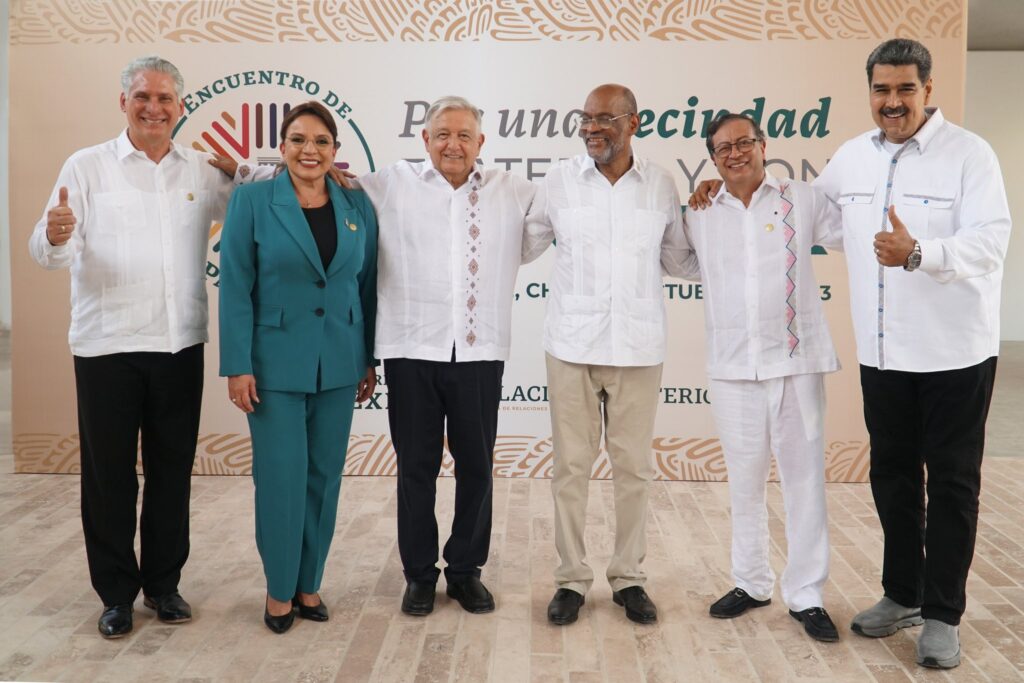By José Luis Granados Ceja for Venezuelanalysis
Leaders from Latin America and the Caribbean put the spotlight on the environmental, political, economic, and social causes of migration, highlighting the negative impact of unilateral coercive measures, in their joint declaration at the Palenque Summit in Mexico.
Mexican President Andrés Manuel López Obrador hosted leaders from Venezuela, Cuba, Panama, Honduras, Ecuador Haiti, Belice, El Salvador, Colombia, and Costa Rica, in the city of Palenque in the Mexican state of Chiapas to discuss a regional approach to the migration crisis in the hemisphere.
Venezuelan President Nicolás Maduro, who attended in person alongside counterparts from Cuba, Honduras, and Colombia, praised the condemnation of unilateral coercive measures, also known as sanctions, in the official statement.
“I thanked the governments attending this important day for their unanimous support for Venezuela in their demand for the total lifting of all criminal and illegal sanctions against our Homeland,” wrote Maduro on social media following the meeting.
The final declaration marked a departure from other recent statements concerning migration in the Americas, such as the Los Angeles Declaration, which has been criticized for falling short in meeting the needs of migrants. The Palenque Declaration, in turn, adopted a decidedly political posture and with an emphasis on human rights. The meeting in Chiapas did not include a representative from the US and instead featured the participation of leaders from countries where the majority of migrants originate from.
The official communique, endorsed by the leaders of the participating nations, stated in its first point that “the main structural causes of migration are of a political, economic, social origin; as well as the negative effects of climate change” before immediately criticizing the “negative effects” of unilateral coercive measures on the “most vulnerable people and communities.”
Both Venezuela and Cuba, with significant populations emigrating and seeking to resettle in the United States, have endured a punishing economic blockade at the hands of the US; with leaders from both countries pinning the blame squarely on US policy toward their countries.
Caracas recently celebrated an announcement by the US Treasury Department easing sanctions on the country, a move that is widely expected to stem the flow of migrants from Venezuela. Washington also recently negotiated a deal to resume direct repatriation flights of Venezuelan nationals. A first flight carrying 127 deportees landed in Caracas last week, with US authorities predicting more regular flights in the future.
Regional leaders additionally agreed to develop an action plan to address the root causes of migration, with a special emphasis on food and energy sovereignty, environmental protection measures, dignified work opportunities, an intra-regional development model, and a coordinated effort to address transnational organized crime and corruption.
The 14-point agreement went on to include calls for countries to provide special assistance and support to Haiti, to reopen the issue of foreign debt, and for the US and Cuba to resume talks aimed at the normalization of diplomatic relations.
Maduro, who held a bilateral meeting with Mexico’s López Obrador on the sidelines of the summit, signaled his country’s intention to support the aims of the Palenque Declaration.
“Venezuela joins with all its strength the Concrete Action Plan of the Palenque Meeting, we feel happy about these agreements. We have a great commitment to the dignified and humane treatment of our migrants,” said the Venezuelan president.
López Obrador remarked that he intended to hand deliver the message from the Palenque Meeting to US President Joe Biden, who he is due to meet next month at the Asia-Pacific Economic Cooperation (APEC) summit in San Francisco.
The Mexican president likewise said he would urge the US president to normalize relations with Cuba and Venezuela.
“What are the Republicans going to say if a dialogue with Cuba is opened? What will Republicans say if talks with Venezuela continue? … Nothing, let them say what they want, but the actions should have humanism and favor justice,” López Obrador said during his usual press conference in Mexico City.
Edited by Ricardo Vaz in Caracas.

